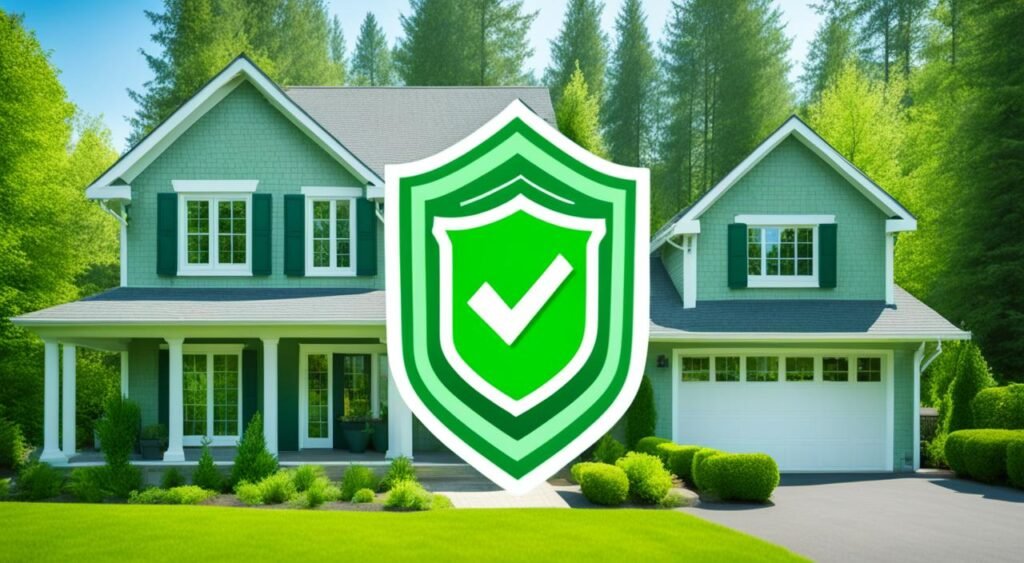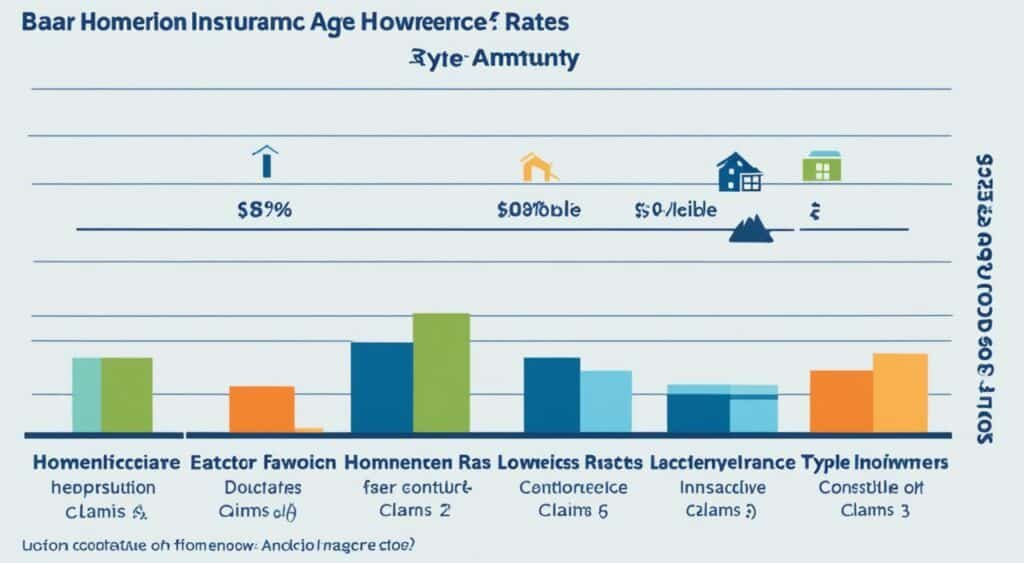Homeowners insurance, known also as home insurance, is key for anyone with property. It protects your home’s structure, your stuff, and covers you if someone gets hurt on your property. Learning the essentials of this insurance is important for new people buying real estate. It keeps your investment safe and your mind at ease.
These insurance policies help if your home is damaged, your things are stolen, or someone is hurt on your land. The coverage you get can be based on actual cash value, replacement cost, or extended replacement cost/value. How much you pay for the policy is decided by the risk the insurer sees in your property. This includes the home’s state, where it’s located, and your past claims.
Key Takeaways
- Homeowners insurance is a necessity, not a luxury, and is typically required by mortgage lenders.
- Policies cover damage to your home, loss or theft of possessions, and personal liability.
- Coverage levels include actual cash value, replacement cost, and extended replacement cost/value.
- Insurance rates are based on factors like your home’s condition, location, and claims history.
- Understanding the basics of homeowners insurance is crucial for new property owners.
Introduction to Homeowners Insurance
Homeowners insurance protects one of life’s big investments – your home. It covers your home’s structure, your things, and liability protection. Plus, it helps with living expenses if your home can’t be lived in because of a disaster.
What is Homeowners Insurance?
This insurance combines coverage. It protects your property from damage and you from legal responsibility. This includes injuries and property damage caused by you or those in your home including pets.
Most disasters are covered, but not all. Floods, earthquakes, and poor maintenance are examples where coverage might not apply.
Importance of Homeowners Insurance
Homeowners insurance is important for many reasons:
- It protects your home’s structure and your belongings from loss or damages.
- It covers you if someone is hurt on your property or if you damage someone else’s property.
- If your home is unlivable due to a disaster, it pays for you to live elsewhere until it’s fixed.
- It offers peace of mind by protecting you and your family from unexpected costs.
Overall, homeowners insurance is an important investment. It helps keep your home, belongings, and financial security safe.
“Homeowners insurance is not just a good idea – it’s an essential protection for one of your most valuable assets.”
Homeowners Insurance Coverage

Being a homeowner means ensuring your major investment is secure. Homeowners insurance offers broad coverage. It protects your home and possessions, through dwelling and personal property coverage.
Dwelling Coverage
Dwelling coverage, or “Coverage A,” aids in your home’s repair or rebuild. It responds to perils like fire, hurricane, hail, and lightning. This part is usually the main in your policy, mirroring rebuilding costs. Homeowners insurance dwelling coverage safeguard your home and your financial investment.
Personal Property Coverage
Homeowners insurance personal property coverage guards your belongings. It ensures items like furniture, clothes, and electronics are safe. This protection applies even if they’re stolen or harmed outside your house. It’s usually 50 to 70 percent of what your home’s structure is insured for. This way, your valuable items are well protected.
These policies are designed to meet the varied needs of homeowners. So, what does homeowners insurance cover? It protects both your house and the things that make it a home.
“Homeowners insurance is a crucial safeguard for your most significant investment – your home. It provides the financial protection you need to repair or rebuild in the event of unexpected damage or loss.”
Liability Protection

Being a homeowner means protecting yourself from legal issues is key. Homeowners insurance includes personal liability coverage. This covers you if someone files a lawsuit for harm or damage caused by you, your family, or pets.
Your homeowners policy’s liability part pays for your defense in court and any damages. This protection is worldwide, not just in your home. It’s advised to have at least $300,000 in coverage. You can also get additional umbrella policies for further protection.
For homeowners, liability coverage is vital. It can save you from severe financial losses due to an accident. If someone gets hurt at your place or your pet injures someone, this coverage helps avoid expensive legal issues.
Knowing about the homeowners insurance liability coverage keeps your family safe in tough times. This security brings peace of mind and protects your assets.
“Liability coverage is crucial in homeowners insurance, saving you from expensive lawsuits.”
In conclusion, homeowners insurance liability coverage is crucial protection. It provides personal liability coverage and protects you from unforeseen financial threats.
Additional Living Expenses
When a disaster like a fire or a storm hits, making your home unlivable, your homeowners insurance’s additional living expenses (ALE) coverage is key. It helps with the extra costs of living somewhere else. This is while your home gets fixed or rebuilt.
This coverage pays for things like staying in a hotel, eating out, and other temporary living costs. It makes sure you and your family can keep up your usual lifestyle even when you can’t be at home.
Remember, there are limits on how much your ALE coverage pays out each day or in total. But, for a bit more money, you can often increase these limits. This extra protection can be a big help if you need to stay away from home for a long time because of a disaster.
If your home is unusable, the homeowners insurance temporary housing benefits are there to help. They cover the additional living expenses homeowners insurance until you can move back in. This helps you manage those extra costs until everything’s back to normal.
“ALE coverage can be a lifesaver when your home is damaged and you need to find alternative accommodations. It’s an important part of your homeowners insurance policy that provides valuable financial protection.”
Types of Homeowners Insurance Policies
Protecting your home and belongings is key. Knowing the types of homeowners insurance policies helps. In the U.S., there are many kinds, from HO-1 to HO-8. Each one gives different levels of coverage and protection.
HO-1 to HO-8 Policy Forms
The HO-3 policy is the most popular and wide-ranging. It covers your home, belongings, and liability. There’s also the HO-2 for less protection, the basic HO-1, and the HO-8 for older houses.
Different living situations need specific coverage. Renters and condo owners, for example, have special policies. The HO-4 and HO-6 focus on covering personal property and liability.
| Policy Type | Coverage |
|---|---|
| HO-1 | Basic, limited coverage for the home’s structure and personal belongings |
| HO-2 | Broader coverage than HO-1, protecting against more named perils |
| HO-3 | The most common and comprehensive homeowners insurance policy, covering the home’s structure, personal belongings, and liability |
| HO-4 | Renters insurance, covering personal property and liability for those who don’t own their homes |
| HO-6 | Condo insurance, protecting the interior of the unit, personal belongings, and liability for condo owners |
| HO-8 | Specialized policy for older homes, with coverage tailored to the unique characteristics of these properties |
It’s crucial to grasp the differences among types of homeowners insurance policies. This knowledge helps homeowners, renters, and condo owners pick the right protection for their home and assets.
Levels of Coverage

Homeowners insurance offers three main coverage levels: actual cash value (ACV), replacement cost, and guaranteed or extended replacement cost. It is important to know the differences between these options. This knowledge helps ensure you pick the right policy for your home and its contents.
Actual Cash Value (ACV) Coverage
ACV policies pay for replacements, but they factor in depreciation. For example, if an old TV is stolen, you get the TV’s current value. These policies cost less but cover you less when something happens.
Replacement Cost Coverage
Replacement cost coverage pays out for full repairs or replacements with no depreciation deducted. This means the full rebuilding cost of your home is covered. It is a more thorough type of coverage but might come with a slightly higher price tag.
Guaranteed/Extended Replacement Cost Coverage
The top level is guaranteed or extended replacement cost, covering rebuild costs even if over your policy limit. It is the best against increased construction expenses. Although more costly, it ensures your home can be fully restored after a catastrophe.
| Coverage Level | Description | Pros | Cons |
|---|---|---|---|
| Actual Cash Value (ACV) | Pays the cost of replacing the home or possessions, minus a deduction for depreciation. | Lower premiums | Less comprehensive coverage |
| Replacement Cost | Covers the full cost of repairing or rebuilding the home and replacing belongings without a deduction for depreciation. | Better protection for homeowners | Higher premiums |
| Guaranteed/Extended Replacement Cost | Pays whatever it costs to rebuild the home, even if it exceeds the policy limit. | Best protection against rising construction costs | Most expensive option |
Choosing the right homeowners insurance is critical. Consider your budget and needs carefully. Your choice of homeowners insurance coverage levels significantly impacts your financial security if you make a claim.
“Homeowners insurance is crucial for safeguarding your home and finances. Knowing the coverage options helps you choose what’s best for you, ensuring optimal protection.”
What Homeowners Insurance Doesn’t Cover
Homeowners insurance is great for covering many risks. But, it doesn’t include every peril you might face. It’s smart to know what’s not covered. This way, you can plan how to protect your home and belongings better.
Damage caused by floods is a big one that’s not normally covered. If a flood hits your home, you’re on your own without extra flood insurance. This is important if you’re in an area prone to flooding.
Just like floods, earthquake damage isn’t covered either. If earthquakes are a threat where you live, consider getting more coverage. You can do this by adding an earthquake endorsement or buying a specific policy.
- Regular wear and tear, like roof leaks, termites, or foundation cracks, isn’t usually covered by insurance.
- Aftermath of sewer or water backups, despite being very damaging, is another thing insurance often doesn’t pay for.
- Pest infestations, from rodents to bugs, are also not covered.
- If someone deliberately damages your home, insurance might not help either.
Also, standard policies don’t handle losses from acts of war, terrorism, or nuclear accidents. For these, special coverage might be needed.
| Excluded Perils | Potential Supplemental Coverage |
|---|---|
| Floods | Separate flood insurance policy |
| Earthquakes | Earthquake endorsement or separate earthquake policy |
| Sewer/water backups | Sewer/water backup endorsement |
| Pest infestations | Pest control service or separate coverage |
| Acts of war, terrorism, nuclear accidents | Separate coverage for these events |
Knowing what your insurance doesn’t cover is crucial. It helps you fully protect your home and everything in it against various risks.
Homeowners Insurance

Homeowners insurance is vital for homeowners. It covers the home’s structure, belongings, and more. If a disaster or accident happens, this insurance helps cover costs. It protects their biggest investment. It saves them from big financial losses.
This insurance is so important because it does a lot. It not just covers the home, but also what’s inside it. It gives peace of mind to homeowners. They know their investment is safe.
If you have a mortgage, getting homeowners insurance is a must. Lenders need this to protect their money. But even without a mortgage, it’s smart to have. It could keep you from losing a lot of money if something bad happens.
| Homeowners Insurance Coverage | Benefits |
|---|---|
| Dwelling Coverage | Protects the home’s structure, like the roof or walls, from damage. |
| Personal Property Coverage | Helps with damage or theft of personal items, such as furniture and clothes. |
| Liability Protection | Covers legal costs if you’re held responsible for someone else’s damages or injuries. |
| Additional Living Expenses | Pays for temporary housing if your home is not livable after a covered event. |
To sum up, getting homeowners insurance is very important. It ensures your home, belongings, and even expenses are covered. This protects your investment and keeps you financially secure in tough times.
Factors Affecting Insurance Rates

Homeowners insurance rates are set based on how much risk the insurance company sees. They look at many things to guess if a claim might be made. This guess affects what the policyholder has to pay.
Home Characteristics
The house’s features are a big deal in deciding rates. Things like the home’s age, materials of construction, and how big it is are key. Older, larger homes often need more costly repairs. The presence of security systems, smoke detectors, and fire extinguishers helps lower claims risk, possibly dropping your insurance rates.
Location and Neighborhood
The where of your home matters a lot in the cost you pay. If you’re in an area prone to natural disasters, expect to pay more. The crime rate in your neighborhood also plays a part. Higher crime zones are at more risk for theft or vandalism, raising insurance costs.
Coverage Options
Your choices in insurance can also sway your rates. Picking how much to deduct, the amount of personal property coverage, and extra coverage options changes your price. Usually, bigger deductibles and richer policies mean you pay more.
| Factor | Impact on Homeowners Insurance Rates |
|---|---|
| Home Age and Construction | Older or larger houses often have higher rates, with more chance of costly damage. |
| Home Security Features | Having security devices in your home can bring down your rates by reducing risks. |
| Geographic Location | Places at high risk for disasters or high in crime have more expensive insurance. |
| Coverage Options | Choosing more coverage and higher deductibles can lead to increased costs. |
Knowing these insurance rate factors can help property owners. Understanding can aid in making choices that keep costs down while getting suitable coverage.
Shopping for Homeowners Insurance
Protecting your home is key, whether it’s your first or you’ve owned before. The task of shopping for homeowners insurance might seem overwhelming. But, if you prepare and research, you can get the right policy for you. This ensures your home is safe without breaking your budget.
Comparing Quotes
To start, get quotes from several insurance companies. It’s wise to get quotes from at least five to find the best offer. Comparing these quotes lets you see what each one offers in terms of coverage, deductibles, and what you’ll pay.
Look closely at the coverage details, including the limits for your dwelling, personal property, and liability. Also, check the deductible amount. A higher deductible can lower your premium. But, you’ll pay more out-of-pocket if you make a claim.
Bundling Options
Bundling your homeowners insurance with your auto insurance is a great way to save money. This can lead to discounts, which help save your money. It’s a beneficial strategy for both you and your finances.
Think about other ways to cut your homeowners insurance costs too. This includes adding a security system, keeping a good credit record, and raising your deductibles if possible. Just make sure you can pay the higher costs out-of-pocket if something happens.
| Comparison Factor | Insurer A | Insurer B | Insurer C |
|---|---|---|---|
| Dwelling Coverage Limit | $300,000 | $325,000 | $350,000 |
| Personal Property Coverage | $150,000 | $175,000 | $200,000 |
| Liability Limit | $300,000 | $500,000 | $500,000 |
| Deductible | $1,000 | $1,500 | $2,000 |
| Annual Premium | $1,200 | $1,350 | $1,500 |
Taking the time to research and compare different homeowners insurance policies is smart. It helps you choose the best coverage at a great price. This protects your home and your savings in the long run.
Maintaining Your Homeowners Insurance
Being a homeowner means you must keep your insurance up to date. This ensures your protection fits the changing value and needs of your home. By maintaining homeowners insurance, updating homeowners insurance, and reviewing homeowners insurance coverage, you safeguard your investment.
It’s key to update your homeowners insurance as your home’s value changes. This might come from improvements, shifts in the market, or natural value increases. Adjusting your coverage makes sure it can still cover the cost of replacing your home if it’s damaged or lost.
Make sure to review your policy every so often. Check to see if it still fits your needs. You might need to add or remove coverage for specific items, change the amount of liability coverage, or update your personal property section. This way, you prevent gaps in protection and keep your policy strong.
And don’t forget to tell your insurer about any major changes you make to your home. This could be big renovations, adding space, or a new security system. These changes can affect how much it would cost to replace your home. Updating your insurer keeps your maintaining homeowners insurance effective and accurate.
| Task | Frequency |
|---|---|
| Review policy coverage | Annually |
| Update home value | Every 2-3 years |
| Report home improvements | As needed |
To protect your home well, keep your insurance active and up to date. By maintaining homeowners insurance, updating homeowners insurance, and reviewing homeowners insurance coverage, your policy will always meet your needs. This guards your most important investment – your home.
“Maintaining your homeowners insurance is a crucial step in protecting your investment and financial security.”
Also Read: Protecting Your Legacy: Understanding The Importance Of Life Insurance
Conclusion
Homeowners insurance is very important for protecting your house, things, and your responsibility to others. It covers many aspects, from the nature of the home and what’s inside to when you might be at fault for someone else’s loss. Knowing the basics, different types, and what makes the price change helps get right protection.
It looks after your house, its contents, and your bills if you have to live elsewhere for a while after a loss. This ensures your financial wellness even in tough times like fires, heavy winds, or thefts. Deciding between actual value and replacement costs for your things can help match your plan to what you need and can pay.
Keeping your insurance up to date is also key. Changes in your home, where it is, or your life can mean you need more or less protection. It doesn’t matter if you’ve just bought a home or if property is not new to you. Staying up to date on the essentials is vital for keeping your home safe, no matter what.
FAQs
What is homeowners insurance?
Homeowners insurance, or home insurance, is a package policy. It covers damage to your property. It also covers liability for any injuries or property damage caused by your family or pets.
Why is homeowners insurance important?
It’s a critical protection, not a luxury. This insurance keeps your home safe. It saves you from huge money losses in a disaster.
What does homeowners insurance cover?
It typically covers home damage, your belongings, and liability. It includes living costs if your home is not livable after a disaster.
What is liability coverage in homeowners insurance?
Liability coverage keeps you safe from others’ lawsuits. It pays for injury or damage you, your family, or pets cause. This includes defending you in court.
What is additional living expenses (ALE) coverage?
It pays for your extra living costs if your home is unlivable after a disaster. This includes hotels, meals, and other costs while your home is fixed.
What are the different types of homeowners insurance policies?
There are several types, from HO-1 to HO-8, with different protections. The HO-3 policy, covering the home’s structure and belongings, is most common.
What are the different levels of homeowners insurance coverage?
The main levels cover actual cash value, replacement cost, or guaranteed replacement. Actual cash value policies replace items after depreciation. Replacement cost fully covers repairs or replacements.
What does homeowners insurance typically not cover?
It does not cover floods, earthquakes, and some other issues. You might need extra policies for these. Also, it won’t cover deliberate damage.
How are homeowners insurance rates determined?
Rates depend on risk of claims. Home and homeowner factors matter. These include claim history, credit, home features, and location.
How can I get the best deal on homeowners insurance?
To find the best deal, compare at least five quotes. Look at coverage and rates. Bundling with auto insurance can save you more.
How often should I review my homeowners insurance policy?
Regular reviews are crucial to ensure enough coverage. Update for home value changes. Add or remove items as your needs change.





